Amid tensions, top Chinese brass visiting US
Updated: 2015-06-09 09:33
By CHEN WEIHUA in Washington and ZHAO SHENGNAN in Beijing(China Daily USA)
|
||||||||
China's Central Military Commission Vice-Chairman Fan Changlong left Beijing on Monday on a trip to the United States as the two countries try to strengthen military-to-military cooperation and exchange, and at the same time tackle the thorny issues of the South China Sea and cyber security.
General Fan is regarded as the highest-level Chinese military leader to visit the US since China's leadership transition in 2012. In the Central Military Commission, Fan ranks immediately after President Xi Jinping, who is also chairman of the military commission.
China's Ministry of National Defense said in a statement on Monday that Fan will lead a delegation to visit the US and Cuba at the invitation of defense ministers of both nations. Key members of the delegation include Sun Jianguo, deputy chief of general staff of the People's Liberation Army; Wu Changde, deputy chief of the PLA General Political Department; and Song Puxuan, head of the Beijing Military Region.
During the six-day trip, Fan and his delegation will first visit San Diego with a stop at the USS Ronald Reagan aircraft carrier and will hold talks on Thursday at the Pentagon with US Defense Secretary Ashton Carter, AFP quoted Pentagon officials as saying.
The Defense News quoted Pentagon officials as saying that besides the aircraft carrier, Fan will also visit three military bases, including Fort Hood, Texas, and a Boeing factory in Seattle.
China and the US have seen growing military-to-military exchanges in the past few years, including China's first participation of the Rim of the Pacific (RIMPAC) naval exercises last year. The two countries have also agreed to work out agreements for military encounters both in international air space and on the high seas.
But tensions have grown too over US frequent military surveillance near China's shores, US criticism of China's construction on the Nansha Islands in the South China Sea and the issue of cyber espionage. The US Justice Department indicted five PLA officers for cyber espionage last year, triggering a strong protest from Beijing and resulting in the suspension of the bilateral working group on cyber security.
Fan's trip came before a planned state visit to the US by President Xi in September and the important China-US Strategic and Economic Dialogue to be held in Washington later this month.
The South China Sea will be a major topic of discussion between Fan and Carter when they meet on Thursday, Defense News said.
Carter has recently said China's construction in the sea is outstripping the others and undermining security in the Asia-Pacific.
But Fan was firm in his comments to US Secretary of State John Kerry when they met in May, saying China's construction activity is within its rights of sovereignty, and its determination to safeguard sovereignty and territorial integrity is "unswerving".
Douglas Paal, vice-president for studies and director of the Asia program at the Carnegie Endowment for International Peace, said it is positive that this visit is proceeding despite recent developments in the South China Sea and the cyber sphere, so that thorny issues can be managed directly.
"It would be helpful if Vice-Chairman Fan and his delegation are able to close the gaps in the two sides' approaches to avoid any incidents between military aircraft, to move to a finished memorandum of understanding, and not just a draft, in time for the meeting between the two presidents in September," Paal told China Daily on Monday.
Ted Carpenter, a senior fellow for defense and foreign policy studies at the Cato Institute, said Fan's visit comes at an especially important time.
"On the cyber issue, both sides need to be a bit more flexible. US officials are too quick to accuse the Chinese government of being involved in hacking incidents. However, the Chinese government does need to enhance its enforcement efforts against Chinese nationals who engage in such activity. Constructive dialogue on this issue could help satisfy both sides," he said.
Carpenter said US and Chinese officials should focus on the most effective ways to prevent nasty incidents that could escalate into a crisis no one really wants. "Better communication is essential," Carpenter told China Daily on Monday.
In a May 18 article on National Interest, Carpenter wrote that although the Obama administration has repeatedly insisted that it remains neutral regarding the substance of the territorial disputes, Washington's actions suggest otherwise.
"Chinese leaders could be forgiven if they conclude that US policy is essentially 'anybody but China' with respect to the competing claims," he wrote.
Wen Bing, a researcher at the PLA Academy of Military Science, said the visit is a key opportunity to push forward military-to-military cooperation.
The most important task now is to strengthen consensus, Wen said, adding that an objective and pragmatic stance would allow them to resolve differences and seek greater cooperation.
Ouyang Yujing, director-general of the Foreign Ministry's Department of Boundary and Ocean Affairs, said in May that China's construction and maintenance of facilities on the islands will "facilitate joint response to challenges at sea and increase navigation safety".
Contact the writers at chenweihua@chinadailyusa.com and zhaoshengnan @chinadaily.com.cn.

 Yes, we are waiting for our children
Yes, we are waiting for our children
 Chinese artist to be recognized at International Muse Awards
Chinese artist to be recognized at International Muse Awards
 2015 Apple WWDC kicks off in San Francisco
2015 Apple WWDC kicks off in San Francisco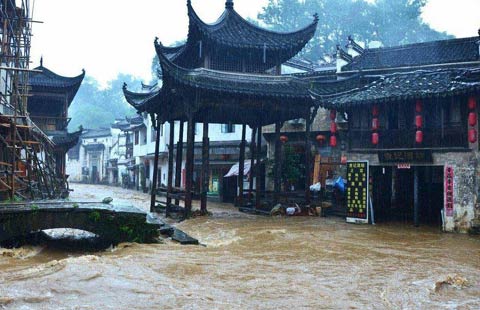
 Ten photos you don't wanna miss - June 9
Ten photos you don't wanna miss - June 9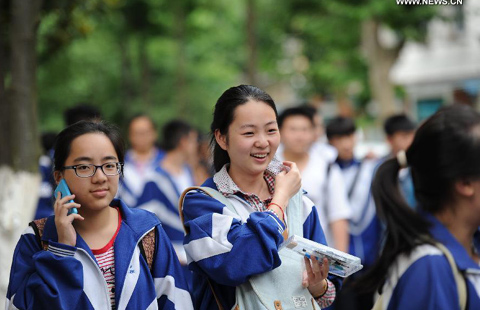
 National college entrance exam ends in most parts of China
National college entrance exam ends in most parts of China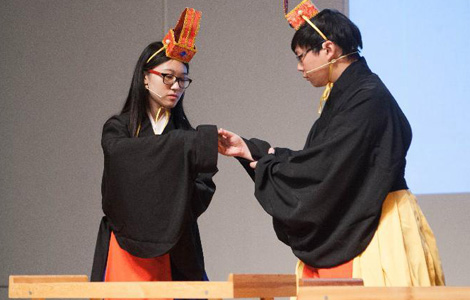
 Peking University opens Chinese traditional art courses
Peking University opens Chinese traditional art courses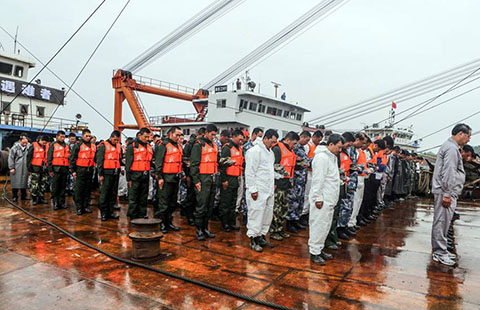
 Rescuers mourn victims on seventh day since Eastern Star disaster
Rescuers mourn victims on seventh day since Eastern Star disaster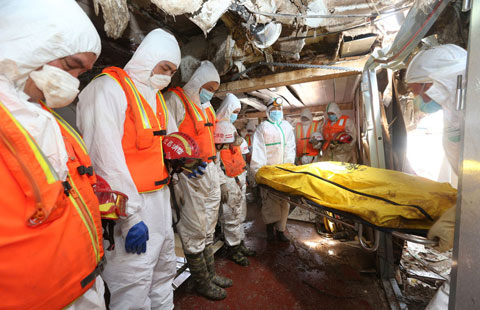
 Rescuers enter Eastern Star hull in search efforts
Rescuers enter Eastern Star hull in search efforts
Most Viewed
Editor's Picks

|

|

|

|

|

|
Today's Top News
Amid tensions, top Chinese brass visiting US
Apple reveals plan to develop all-platform eco-system empire
Video of officer who drew gun on black teens raises tension
Suu Kyi visit to boost ties with Myanmar
China gives its yuan to Broadway
Questions remain unresolved in the cruise ship disaster
Escaped New York prisoners may have had help from staff
Memphis hospital adds new China affiliate
US Weekly

|

|






